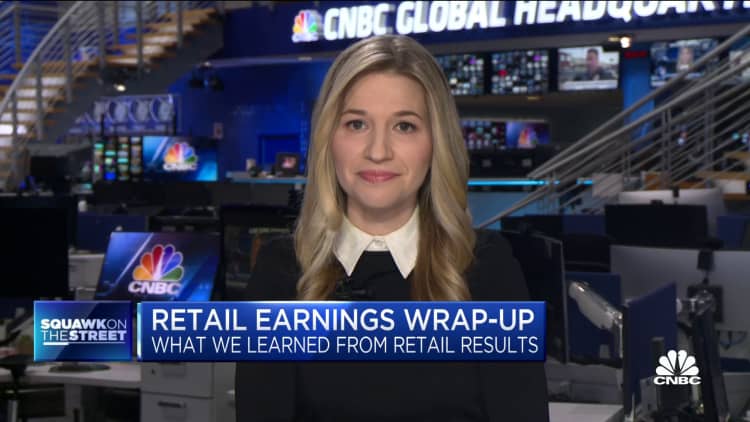Shoppers walk past a sale sign as Black Friday sales begin at The Outlet Shoppes of the Bluegrass in Simpsonville, Kentucky on November 26, 2021.
Jon Cherry | Reuters
Major retailers are under intense pressure to deliver on Black Friday after several reported slowing sales ahead of the holiday shopping season.
Macy’s, Target, Kohls, Difference and Nordström spoke of a lull in sales in late October and early November. Target cut its outlook for the holiday quarter and Kohl’s withdrew its forecast, citing slow sales. Macy’s CEO Jeff Gennette said shoppers continued to visit its stores and website during the lull, but the browsing didn’t turn into a purchase. best buy CEO Corie Barry said buyers were showing more interest in sales than usual.
investment related news

These results illustrate an emerging theme this season: buyers are waiting for the biggest and best deals, especially as inflation hits their wallets.
“People are willing to wait and be patient,” said Rob Garf, vice president and general manager of retail for Salesforce, a software company that also tracks buying trends. “The discount chicken game is back and consumers will win.”
This big appetite for deals is fueling higher expectations for a bigger Black Friday weekend. Many major retailers, including Walmart and Target, will remain closed on Thanksgiving. Still, a record number of people – 166.3 million – are expected to shop over the weekend, which runs from Thursday through Cyber Monday, according to an annual survey by the National Retail Federation and Prosper Insights & Analytics.
This represents an increase of nearly 8 million people from a year ago and the highest estimate since NRF began tracking data in 2017.

Retailers and industry watchers had expected a more subdued holiday season, with sales driven more by higher prices than a huge appetite for merchandise. The National Retail Federation predicts sales will increase by 6% to 8%, including rising near-record inflation levels.
Travel and experiences are also competing more fiercely for Americans’ wallets, as concerns about Covid-19 fade.
Retail executives who reported profits spoke of a return to the pre-pandemic gift-buying style. Over the past two years, consumers have shopped earlier and stretched out gift purchases amid fears of shipping delays and out-of-stocks caused by surging online sales and congested ports.
This year, retailers again started sales early, but steered them toward selling off excess inventory and catering to a more value-oriented consumer. Amazon launched a second Prime Day-like sale in October, and Target and Walmart had competing sales around the same time.
Buy strategically
Yet, until now, buyers have been in no rush to buy.
Best Buy CEO Barry said the company’s October sales were the quarter’s slowest compared to a year ago. She said the backdrop was very different from a year ago, when shoppers were buying early and worried they might not get all the items on their wish list.
“That buying momentum just isn’t there this year,” she said. “Your average consumer knows there’s plenty of inventory and the price will be competitive.”
She said Best Buy now expects customers to spend more during Black Friday, Cyber Monday and the two weeks leading up to Christmas. The company has extended hours, staffed stores and even timed inventory for that schedule, she said.
Not only do you have dollars moving towards travel and entertainment, but you also have dollars moving towards needs.
Chris Horvers
JPMorgan Analyst
Other factors may also have dampened demand in late October and November. In recent earnings calls, Gap and Nordstrom executives referenced unusually warm weather in the fall, which may have prompted consumers not to rush to stores to buy winter coats. winter or thick sweaters.
Additionally, some Americans were tuned into the midterm elections — hotly contested races that caught their attention and may also have contributed to economic uncertainty, said equity research analyst Chris Horvers. which covers retail for JPMorgan.
But, he added, a weaker start to the holiday has also raised consumer health alarms. Retailers were cautious when sharing their hopes for the season – and they hinted at consumers dipping into savings accounts and racking up credit card balances, despite stronger than expected results for the third trimester.
“Not only do you have dollars moving toward travel and entertainment,” Horvers said, “you also have dollars moving toward needs.”
Plus, he said, it’s not all good news if people show up for Black Friday weekend.
“If the consumer reacts to promotions this week and to stores but then stops spending shortly thereafter, that will reinforce this concern that retailers already have that the consumer only buys when needed and will only buy when needed. there is a discount.”



